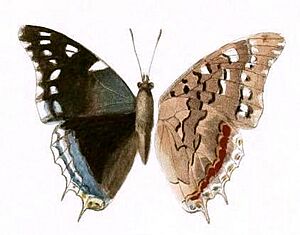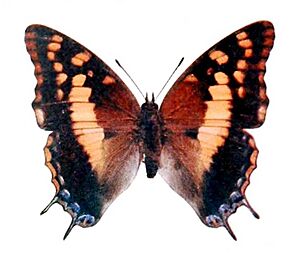Blue-spangled emperor facts for kids
Quick facts for kids Blue-spangled emperor |
|
|---|---|
 |
|
| Male | |
 |
|
| Female | |
| Conservation status | |
| Scientific classification |
|
| Kingdom: | Animalia |
| Phylum: | Arthropoda |
| Class: | Insecta |
| Order: | Lepidoptera |
| Family: | Nymphalidae |
| Genus: | Charaxes |
| Species: |
C. guderiana
|
| Binomial name | |
| Charaxes guderiana (Dewitz, 1879)
|
|
| Script error: The function "autoWithCaption" does not exist. | |
| Synonyms | |
|
|
Script error: No such module "Check for conflicting parameters".
The Charaxes guderiana, also known as the blue-spangled emperor, is a beautiful butterfly. It belongs to the Nymphalidae family, which includes many well-known butterflies. You can find this butterfly in southern Africa.
Contents
What Does the Blue-Spangled Emperor Look Like?
This butterfly has different looks for males and females. This is called sexual dimorphism.
How Big Are They?
Male blue-spangled emperors have a wingspan of about 50 to 60 millimeters (2 to 2.4 inches). Females are a bit larger, with a wingspan of 60 to 70 millimeters (2.4 to 2.8 inches).
Male Butterfly Appearance
The male blue-spangled emperor has mostly black wings on top. Near the body, the front wings have a greenish-blue color. There's a large white spot and other smaller white spots further out. The hindwings (back wings) have a blue band with fine black lines. They also have thick white spots along the edges.
Female Butterfly Appearance
The female looks quite different from the male. Her wings are light brown near the body. They have a wide, bright orange-yellow band across the middle of both wings. The tips of her front wings are black. The hindwings have a black band, followed by blue spots with white centers. The edges of her wings have bright orange-yellow spots.
Where Does the Blue-Spangled Emperor Live?
This butterfly lives in areas called Miombo woodlands. These are forests mainly made up of Brachystegia trees. You can find them across many parts of southern Africa. This includes Angola, Namibia, Botswana, Zimbabwe, Zambia, and parts of Tanzania and South Africa. There's also a special type found along the coast of Kenya.
What Do They Eat?
The young butterflies, called larvae or caterpillars, feed on the leaves of several trees. These include Brachystegia spicaeformis, Brachystegia boehmii, Brachystegia taxifolia, Julbernardia globiflora, Amblygonocarpus andongensis, and Dalbergia lactea.
When Do They Fly?
You can see the blue-spangled emperor flying throughout the entire year.
Different Types of Blue-Spangled Emperors
Scientists have identified two main types, or subspecies, of this butterfly:
- C. g. guderiana (Dewitz, 1879): This type is found in many southern African countries. These include Angola, Zimbabwe, Zambia, and South Africa.
- C. g. rabaiensis Poulton, 1929: This type lives specifically along the coast of Kenya.
How Scientists Classify Them
The blue-spangled emperor belongs to a larger group of butterflies. This group is called the Charaxes etheocles species group. Scientists use these groups to understand how different butterflies are related.
 | Leon Lynch |
 | Milton P. Webster |
 | Ferdinand Smith |


